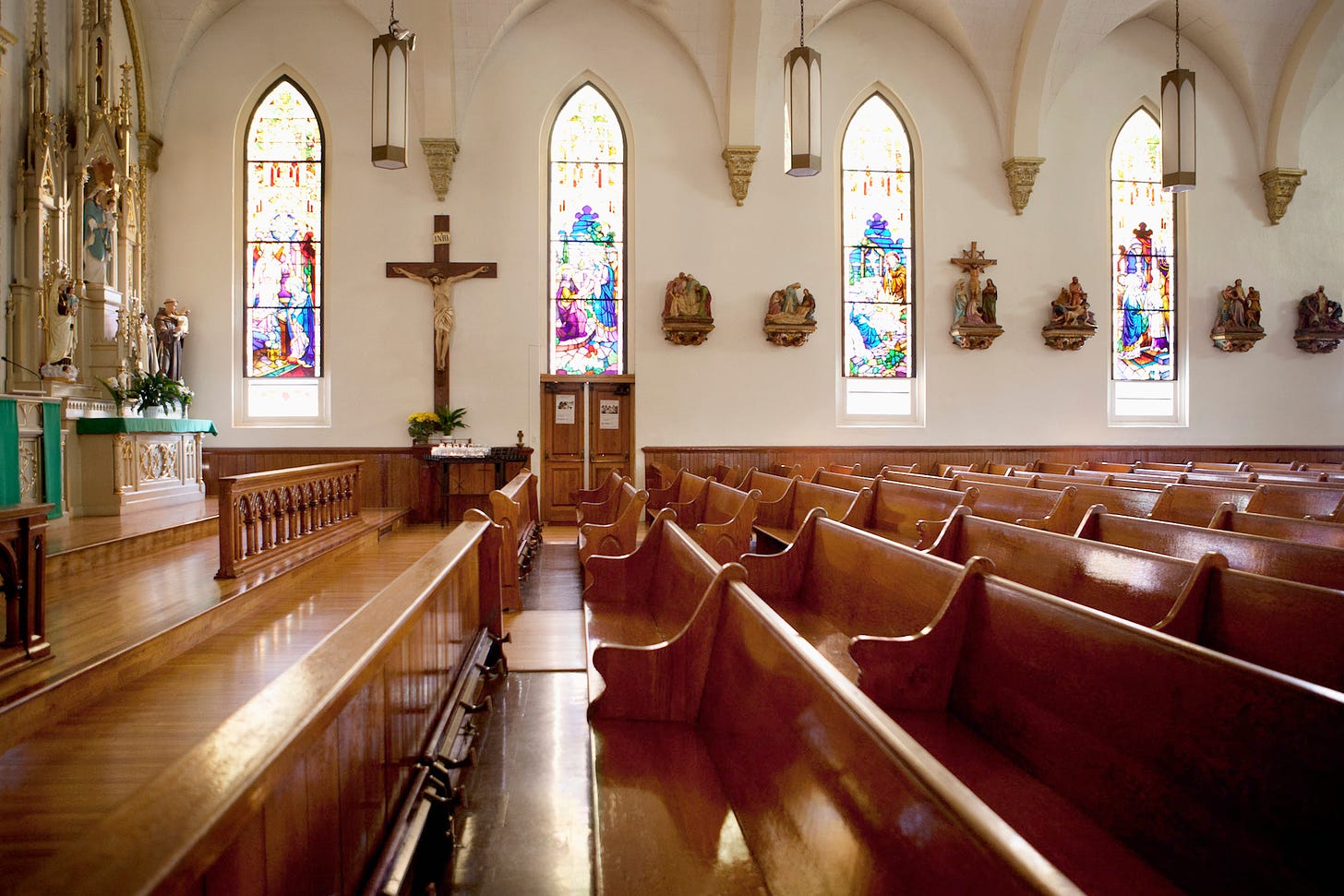What I learned from all of you.
Why you go to church, why you don't, why you used to but don't anymore...
First, I was a church kid.
My family attended our Church of Christ three times a week (Sunday morning, Sunday night, Wednesday night) and in between, we often hosted Bible studies and devotionals in our home. Everyone I knew was from church and we were a tight community. In fact, I think I have been trying to recreate that sense of community my entire life.
Then, I was a church refugee.
But when what I was told was true started in my teenage years to conflict with what I experienced to be true, I had to walk away.
The moment I was able to recognize the difference between what people said (all sex outside of heterosexual marriage is forbidden) and what they did (clandestine affairs with each other) and the difference between what they taught (women were inferior and subordinate to men) and the reality I experienced in the world (then why am I smarter than my male Sunday school teacher?), I knew that I had get out. I was a strong, smart and smart-mouthed girl, and the church I was raised in had no place for that kind of thing even though they loved me. -Nadia Bolz-Weber
Pastrix; The Cranky, Beautiful Faith of a Sinner & Saint (2013)
I left the church long before the term “deconstruction” was popularized. In fact, I spent an entire decade away from the church - it took that long for something inside me to heal enough to return to Christianity whole and (to some extent) on my own terms.
All of that is to say, I have the deepest compassion for those who say “I just can’t ‘do church’ anymore”.
Then, I was a church planter.
For eleven years of my life I dedicated myself (creatively, theologically, emotionally) to starting a church from scratch. It was the most difficult and most rewarding work I’ve ever done.
At its best, that church was filled with laughter, joy, tears, mischief, sorrow, celebration, singing and lots of different kinds of people who didn’t match each other.
People showed up for each other. We named and held the world’s most broken realities with prayer and art and honesty and we did it without looking away. We prayed like hell. And we had so much fun.
All of that is to say, I also have the deepest compassion for those who say “I love my church so much”.
I am for sure not a researcher, but…
The day before yesterday I asked if there was anything you wanted to say about your habits around attending religious services. I cannot believe how many responses we collected! It took me over 5 hours to read them all.
I am genuinely grateful for and fascinated by all of your comments. Thank you.
One thing that stood out is that the reasons you have for continuing to be a part of your worshipping communities are largely similar but the reasons you have for no longer being a part of a worshipping community are wildly varied.
Some reasons we do not attend religious services:
We do not align theologically anymore with the church.
We do not align politically with the church (it has gotten either too liberal or too conservative and has replaced the Gospel with ideology).
We simply cannot be a part of a church that does not welcome, include, and celebrate everyone.
We just got out of the habit during COVID and haven’t mustered up the will to return.
Our lives are busy, and so Sunday mornings are too precious to spend waking early, getting dressed up and driving to go somewhere to be around people.
We were too hurt by church to ever heal enough to return again.
The pastor we loved is gone and the new one isn’t to our liking.
When COVID hit we were deeply disappointed in the church’s response: either because of a perceived over-response (succumbing to fear and closing its doors), or because of a perceived under-response (too cavalier in opening back up and ending mask requirements).
We find connection with God and others more elsewhere than in the church.
Some reasons we DO regularly attend religious services:
We have a feeling of belonging there and the community is welcoming and inclusive, cares about loving the neighbor, and cares for those on the margins.
Worshipping with others is an important part of our faith.
We are paid to be there (staff and clergy).
Also mentioned quite often:
We pivoted to ZOOM during COVID and never pivoted back (for reasons of health, proximity or comfort) so still attend, albeit virtually.
In yesterday’s essay, I mentioned the Jake Meador piece on why folks have stopped going to church. I agreed with a couple points he made - but found something oddly missing.
He seems to lay blame at the feet of two primary causes: 1. “moral failing” (and the church’s inability to hold people to account), and 2. the American culture of “workism”, a system set up to:
maximize individual accomplishment as defined by professional and financial success. Such a system leaves precious little time or energy for forms of community that don’t contribute to one’s own professional life or, as one ages, the professional prospects of one’s children.
I agree that when church leaders take advantage of others sexually, financially or emotionally and then face no real consequences, it can understandably cause folks to walk away from church. Since the work he is citing is from The Gospel Coalition, I am going to assume that the “moral failing” they refer to are mostly ones of a sexual nature. (I’ve argued elsewhere that the Evangelical obsession with so-called “sexual purity” actually fosters the exact kind of shame and secrecy that leads to MORE harmful sexual behavior rather than LESS, but I digress.) I could be wrong.
And his second point about the grind of American culture is well taken.
But many of you guys responded by saying that you left your church because you could not stomach the Christian Nationalism that was creeping in. Many of you said that you loved your church so much, but then your kid came out as gay and your congregation was horrible to your family and so you walked.
What I find fascinating is that none of these were mentioned by Meador as reasons people don’t come to church anymore.
ad hominem
But the Gospel Coalitions folks aren’t the only ones to draw conclusions that happen to already support their worldview. I do it too. Asking my readers why they go to church or have stopped is great but come on, it’s a flawed sample. I just feel the need to confess that my conclusions are not free from my own confirmation bias. This is a deeply human flaw. Leaders of churches, when trying to explain why the pews are emptier than ever, tend to offer arguments about the character and values of the people who have left. Those who have left, when trying to explain why they vacated the pews, tend to offer arguments about the character and values of the leaders of the church.
If anyone else has 5-6 hours to read the comments from Tuesday and offer analysis, I’d welcome it!
Until then, and as always…be gentle with yourselves.
Love, Nadia






Ah church .... such a long and complicated journey we've had.
I loved you as a kid, involved in CCD and the folk group. I walked away as a teen, knowing i was gay, and thought you were a boring waste of time. I used you for solace and safety as a homless drug addict on the streets of NY. I abused you as a place to meet 'clients' when I was selling drugs. I found you again in prison and found myself singing all the hymns of my youth acapella to other inmates.
I cursed you when i relapsed and was back on the streets but darkened your doors on occasion.
I returned to you at Hope House, the treatment center that saved my life. I worked for you as a cantor and musician during my early recovery. I was angry at you when my brother overdosed and then his daughter died of anorexia five years later. This time though,I stuck around. I was led to you in Madrid, Spain where I'm lucky enough to lend my voice to a colorful, inclusive congregation. I am hesitant to believe all I hear but I find truth in the gospel, comfort in Jesus and the kinetic energy of the Holy Spirit.
Ah church, thank you for always having your doors open. So glad I made it home. ✨
Thanks for your latest, Nadia. As both a person in the pew and now a second-career pastor with a small, aging and faithful (to "God", not me) congregation, I've always been amazed by our reluctance within the church to acknowledge that we might possibly be part of the reason "those parents drop their kids off but never come to worship". I'm saddened by how many people have been broken, rather than healed, by the "Church". I've considered myself a "deconstructionist" for longer than I've been aware there was such a thing and am happy to now have a "category" to fit into. Why are we so afraid to simply let God (Love) be God (Love) and set ourselves towards carrying that love both inside and outside of our buildings? Thanks, as always, for your insight, experience, vulnerability, and hopefulness. When we find ways to trust our Creator rather than relying on ourselves, we have reason to hope...